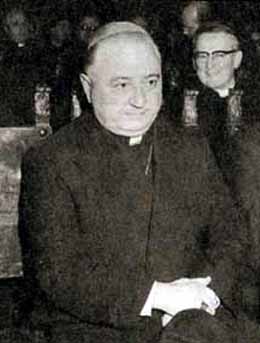Online Source: www.tfp.org
The Agents of the Revolution: Freemasonry and Other Secret Forces
Since we are studying the driving forces of the Revolution, we must say a word about its agents.
We do not believe that the mere dynamism of the passions and errors of men could coordinate such diverse means to achieve a single end, namely, the victory of the Revolution.
The production of a process as consistent and continuous as that of the Revolution amid the thousand vicissitudes of centuries fraught with surprises of every kind seems impossible to us without the action of successive generations of extraordinarily intelligent and powerful conspirators. To think that the Revolution could have reached its present state in the absence of such conspirators is like believing that hundreds of letters thrown out a window could arrange themselves on the ground to spell out a literary piece, Carducci's "Ode to Satan," for instance.
Heretofore, the driving forces of the Revolution have been manipulated by most sagacious agents, who have used them as means for carrying out the revolutionary process.
Generally speaking, one can classify as agents of the Revolution all the sects - whatever their nature - engendered by it, from its origin to our days, to disseminate its thought or to concatenate its plots. The master sect, however, around which all the others are organized as mere auxiliaries - sometimes consciously and other times not - is Freemasonry, as clearly follows from the pontifical documents, especially Leo XIII's encyclical Humanum genus, of April 20, 1884.
The success of these conspirators, and particularly Freemasonry, is due not only to their indisputable capacity to organize and conspire, but also to their clear understanding of the Revolution's profound essence and of the use of natural laws-the laws of politics, sociology, psychology, art, economics, and so forth - to advance the attaining of their goals.
In this way, the agents of chaos and subversion are like a scientist who, instead of merely relying on his own strength, studies and activates natural forces a thousand times more powerful than he.
Besides largely explaining the success of the Revolution, this provides an important indication for the soldiers of the Counter-Revolution.



.jpg)






3 comments:
I have never heard of this book before, but having read some reviews of it, I really want to read the whole thing. It seems like a good, albeit older, companion to Romano Amerio's Iota Unum.
Also, the link to the electronic version you have is dead. Here is a link to the cached version of the whole book for free in English.
Ok, thanks. I fixed the link problem. That's a problem with the new version of blogger, actually: you embed a link over several words, and sometimes only a few of the words end up with the correct link, whereas the others (usually the first few words) link you to some non-existent page. I hope they fix it soon.
The book is great, by the way. Very abstract/philosophical: it describes the philosophical foundations of the modern revolution. Dr. Plinio Correa de Oliveira was an important traditionalist Catholic. He was the founder of the TFP, and has a few very influential books, especially this one and "Nobility and Analogous Traditional Elites in the Allocutions of Pius XII." His criticism is aimed more at the cultural/political side of the crisis (rather than the ecclesiastical or liturgical side, which is what people like Amerio and Ferrara deal with).
Anyone who likes Revolution and Counter-Revolution should also look into Plinio Corrêa de Oliveira's talks on organic society featured on Tradition in Action: http://traditioninaction.org/OrganicSociety/000_Index.htm
Post a Comment